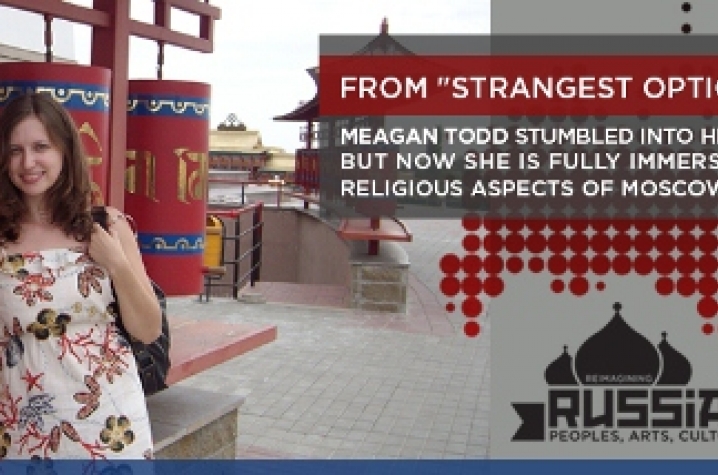UK Student's Undergraduate Experience Leads Her to Russia

LEXINGTON, Ky. (Aug. 9, 2012) — Between a minor in Russian Studies and two degrees in Geography (bachelor’s 2007, master's 2010), UK graduate Meagan Todd learned a lot during her time at the University of Kentucky. However, Todd said that the most important thing she learned was what she wanted to pursue throughout her future.
“My experiences as an undergraduate and graduate student at Kentucky made me realize I could take my interests and make them into a career," Todd said. “The nice thing about academia is that what you’re interested in is your job. There’s not really a divide between hobby and work.”
Today, Todd is a doctoral student at the University of Colorado – Boulder making preparations for dissertation fieldwork in Moscow. Her journey began with a Russian language class as a freshman, which Todd considered the “strangest option” when signing up for classes.
“I never had the option to study Russian in high school, and it seemed like it would be really challenging. I always liked reading Russian literature, so I signed up,” she said.
Todd didn’t plan on pursuing Russian when she came to UK in 2003, but her interest grew as she learned more about Russian politics and history.
“I gained a lot from classes on Russian culture, literature and geography,” Todd said. “I later became a geography student while I was looking for a discipline that could help combine my regional focus with a critical approach to understanding the interrelationships of cultural and political life.”
Now an experienced world traveler, Todd remembers seeing pieces of Russian culture in classes at UK and thinking that she would never get the chance to actually visit Russia.
“Professor Rouhier-Willoughby and Professor Ruder would bring things like Russian train tickets to class to use as props for conversation," Todd said. "I never thought I would have a Russian train ticket. It felt amazing when I bought my first one for a trip from Saint Petersburg to Moscow."
Todd’s dissertation research deals with religion and political geography in Russia. She said that Russia is the most diverse country in the world, with many faith groups and over 200 nationalities. Russia also has history with several religions – Orthodoxy, Judaism, Buddhism, Islam and others – which are complicated by the transition to a secular democracy.
Todd’s research is currently focused on the localized politics of mosque construction in Moscow. She hopes that her findings on Islamic spaces in Moscow will contribute to a better understanding of the development of civil society, minority rights and religiosity in post-Soviet Russia.
“Moscow is home to many migrants from Muslim areas, and they are experiencing overcrowding in mosques,” Todd explained. “Moscow’s religiously diverse population includes an estimated 2 million Muslims out of 11.5 million residents, but only four mosques serve the Muslim community.”
Todd’s interest in this topic stems from her time at UK, when she noticed a gap in understanding the role of minor religions in Russia.
“I took a lot of Russian history classes with Dan Rowland, and he taught me so much about Orthodoxy in Russian culture. But there’s just not much out there about the role of Islam,” she said.
Todd also says that she was inspired by her master’s thesis advisor Patricia Ehrkamp, who does research on the geographies of citizenship and immigration of Turks in Germany.
Todd’s dissertation research is facilitated by a special fellowship from American Councils. The fellowship will provide Todd with additional language training and allow her to spend nine months in Moscow interviewing both locals at established mosques and groups opposed to building new mosques.
The upcoming trip will not be her first journey to Russia: among her previous visits, Todd has done research through two summer fellowships funded by Critical Language Scholarships from the US Department of State’s Bureau of Education and Cultural Affairs.
“Thanks to the Critical Language Scholarship Program, I have taken courses in Russian phonetics, history and conversation with Russian teachers, lived with Russian families as well as traveled to many different cities, from Suzdal to Volgograd,” Todd said.
All along the way, Todd’s research has benefited from the educational foundation she obtained at UK. According to Todd, her time at UK provided her not only with language skills but with valuable theoretical background and research skills as well.
She also acknowledges that her success was made possible by the guidance of good professors.
“I am so grateful for the support from faculty members, especially Patricia Ehrkamp and Stan Brunn from the Geography Department,” she said.
Most importantly, Todd is appreciative of the opportunities she had to pursue her interests outside of the classroom.
“I had a professor who would show Russian movies at her house. Even my roommates were people I met in Russian classes. I got to experience a lot in and out of the classroom.”
MEDIA CONTACT: Sarah Geegan, (859)257-5365; sarah.geegan@uky.edu




